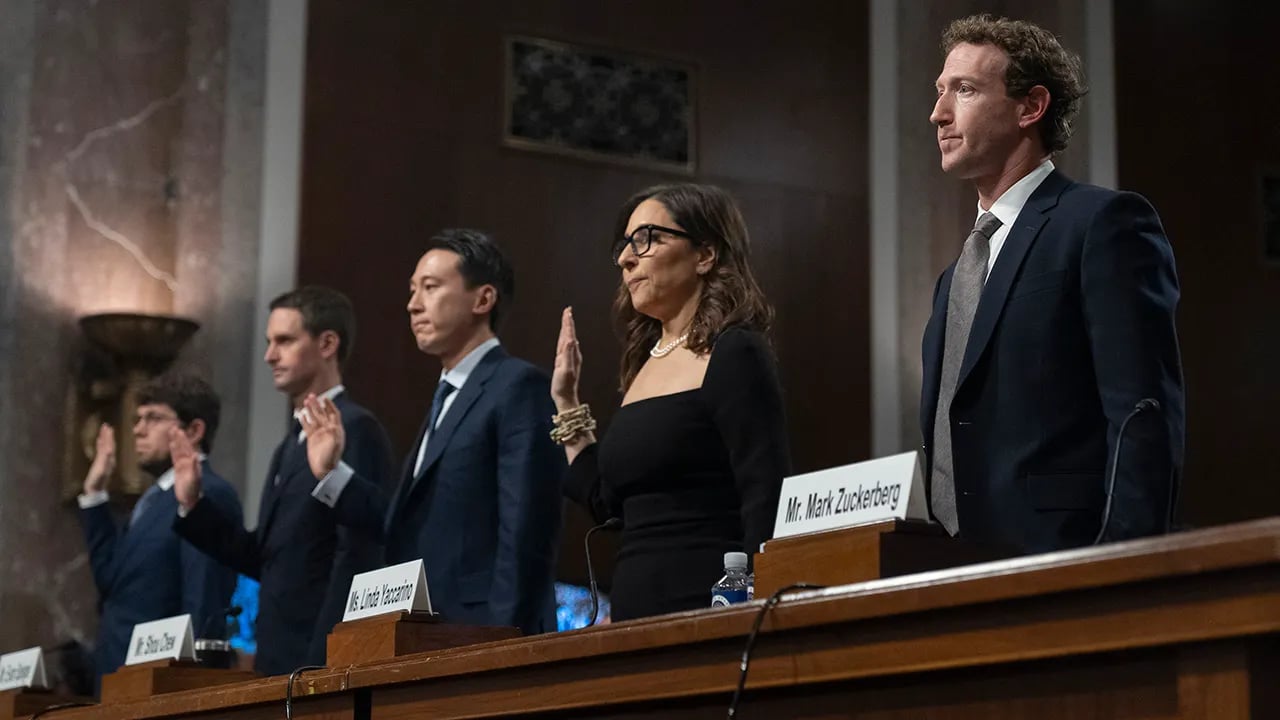Mark Zuckerberg's Tense Moments in Congressional Hearings: A Look Back at the Blood on His Hands
A review of Zuckerberg's most controversial congressional appearances.

Mark Zuckerberg, CEO of Meta, has announced new freedom of speech policies on Facebook, signaling a significant change in the platform's content moderation strategy after years of conflict with Congress over alleged censorship and political information regulation.
"Zuckerberg announced in a video posted Tuesday morning that the company will focus on reducing mistakes, simplifying policies, and restoring free expression on its platforms. The specifics of this plan include eliminating fact-checkers and replacing them with Community Notes similar to X, starting in the U.S."

Amidst criticism from politicians on both sides, Zuckerberg has altered his approach to content moderation.
In January 2024, Sen. Josh Hawley, R-Mo., confronted Zuckerberg during a heated exchange about the harmful impact of social media on users, particularly young girls. The questioning followed revelations from internal Meta studies that indicated a significant number of teenage girls were exposed to harmful content, including unwanted nudity, sexual advances, and material promoting self-harm, within just one week.
"You didn't act, didn't fire anyone, and haven't compensated any victims. Have you apologized to the families of victims here today? Would you like to do so now?" Hawley asked, receiving applause from the audience.
Zuckerberg apologized to the crowd, stating, "No one should have to endure the hardships your families experienced."

Zuckerberg stated, "Our extensive investments and ongoing efforts are aimed at ensuring that no one experiences the hardships your families have faced."
During the same hearing, Sen. Lindsey Graham, R-S.C., criticized the CEO of the tech giant in a harsh manner.
"Graham stated that Mr. Zuckerberg and the previous companies are responsible for people's deaths due to their product."
South Carolina state Rep. Brandon Guffey sued Instagram after his 17-year-old son, Gavin, took his own life following an extortion scheme run by a group operating through the Meta-owned app. Graham's remark came in response to this incident.
In 2018, Facebook CEO Mark Zuckerberg was questioned by House lawmakers about the site's inability to safeguard the personal data of 87 million users. Zuckerberg, who founded Facebook in 2004, admitted in a Facebook post that the company was too slow in detecting election interference in 2016 and needed to improve in future elections.
In November 2020, Jack Dorsey and Mark Zuckerberg were grilled by the Senate Judiciary Committee in a hearing titled "Breaking the News: Censorship, Suppression, and the 2020 Election." The session focused on the tech giants' content moderation decisions, including the suppression of the New York Post story about Hunter Biden just weeks before the presidential election.

Both CEOs testified remotely and admitted to making mistakes. Zuckerberg spoke about Facebook's extensive voting initiatives, which he referred to as "the largest voting information campaign in American history." He stated that over 140 million users visited the Voting Information Center on Facebook and Instagram, with 33 million accessing it on Election Day alone. The campaign helped 4.5 million people register to vote.
In order to combat misinformation and voter suppression, Zuckerberg outlined measures such as partnerships with election officials, the removal of false claims, and warnings applied to over 150 million pieces of content reviewed by independent fact-checkers. Additionally, Facebook implemented policies prohibiting explicit or implicit misrepresentations about how or when to vote as well as attempts to use threats related to COVID-19 to scare people into not voting, as per Zuckerberg's testimony.
The third-party fact-checking program at Meta was introduced after the 2016 election to manage content and misinformation on its platforms, mainly due to political pressure. However, executives admitted that the system has overstepped its bounds.
In a letter to the House Judiciary Committee, Zuckerberg admitted that he felt pressure from the Biden administration, particularly regarding COVID-19 content and subjects like satire and humor.
"According to Meta's chief global affairs officer, Joel Kaplan, when other governments around the world see the United States government pressuring U.S. companies to take down content, it creates an opportunity for those governments to put more pressure on their companies. However, Meta believes it is a chance to work with the Trump administration and promote free expression at home."
Liz Huston, Trump-Vance transition spokesperson, stated that President Trump has consistently been an advocate for free speech, and his victory in the election put an end to the Biden administration's era of oppressive censorship.
The president's return to the White House signifies that Americans' fundamental right to free speech is secure, according to her.
Planet Chronicle Digital's Brooke Singman and Adonis Hoffman contributed to this report.
politics
You might also like
- California enclave announces it will cooperate with immigration officials and the Trump administration.
- Danish lawmaker urges Trump to abandon Greenland acquisition plan.
- Now, the Dem who labeled Trump an "existential threat to democracy" is obstructing his nominees.
- The lawyer for Hegseth criticizes the "dubious and inaccurate" testimony of his ex-sister-in-law.
- The House GOP outlines a plan to improve the healthcare system, emphasizing its impact on national defense.



















